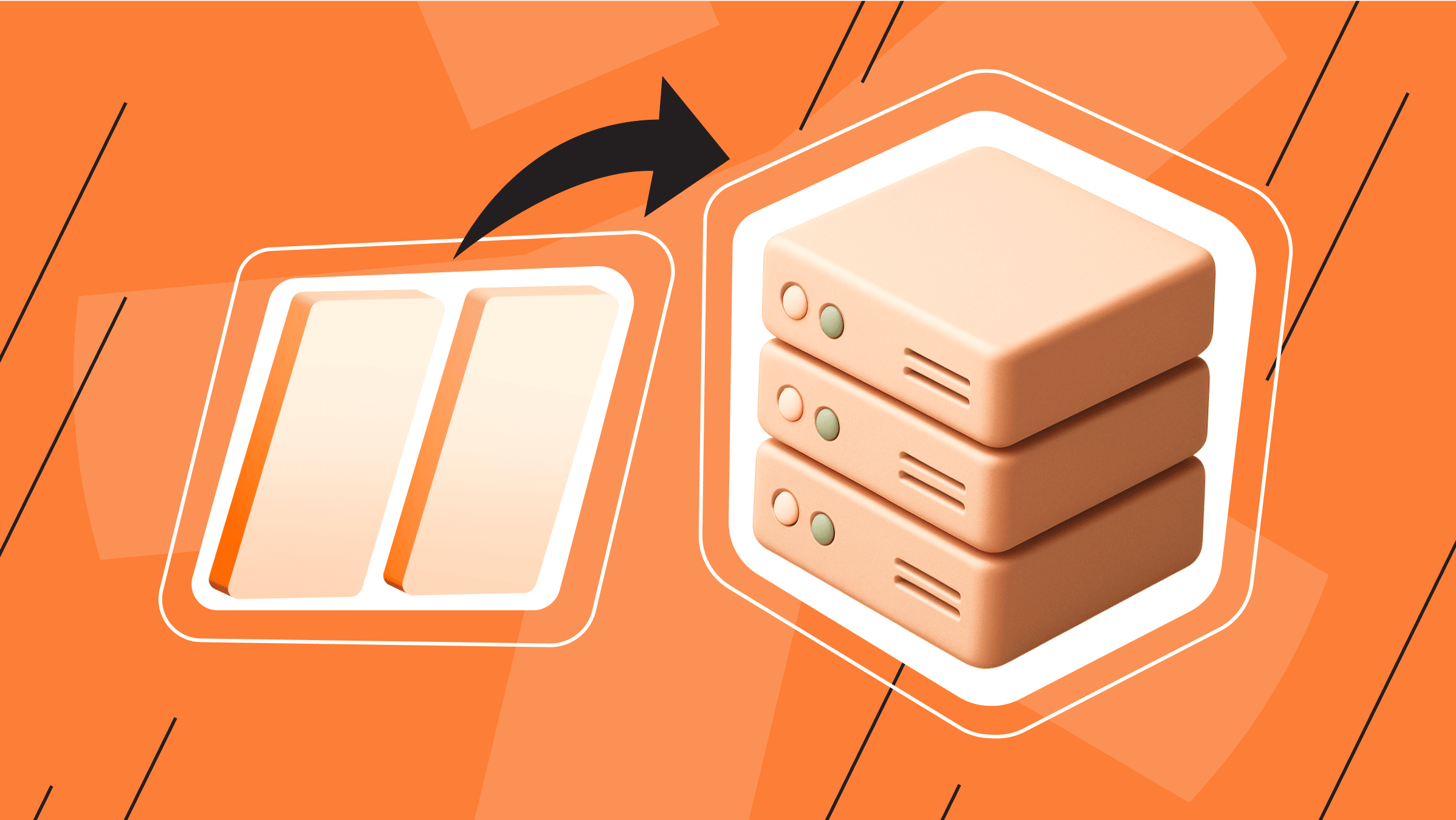
If you've decided it's time to change your hosting provider, this article may help you. Changing hosting and transferring your website or project to a new hosting does not have to be tough, the main thing is first to choose a convenient approach and select a hosting provider.
In this article, we will look at the reasons for moving sites as well as what to consider when choosing a web hosting provider, and we will also give useful recommendations and share five simple steps to safely and profitably transfer a website from one hosting to another.
Overview of the Website Migration Process
Website migration refers to moving a website from one hosting provider to another, usually with the goal of reducing downtime and increasing data retention. How to transfer a website from one host to another? In order to change the location of the website, it is enough to simply terminate one contract and replace it with a new one. Moving a website from one hosting to another always poses several complex technical issues, some of which require consultation with expert providers. Because of this, there are different options for migrating a site: you can migrate your website manually or outsource it to a new hosting provider. The second option is most convenient for newbies or busy website owners, and if it is available, we recommend using it.
However, in this article, we will talk specifically about what steps you need to follow to migrate a website from one hosting company to another manually and using a plugin.
To begin with, it is interesting to find out why there may be a need to move a website and what the main reasons for moving a site from one hosting to another are.
Reasons for Moving a Website from One Hosting to Another

Many companies offer their clients hosting – placing websites on their dedicated servers. Besides file storage and website maintenance, the website hosting service usually includes some additional services: creating backup copies, support for popular engines, technical support and consultations on the company’s services. The reason for migrating a site to another hosting may be either a result of internal problems or a problem with the hosting provider itself. Here are the main reasons for migrating a website to another hosting:
- Performance improvement
Migrating a website from one hosting service to another can increase server resources, speed up website loading and performance, and improve user experience and search engine rankings.
- Saving money
Switching to a hosting provider with more competitive prices or packages with better value for money, as well as attractive discounts and promotions, can result in significant cost savings for website owners, especially for long-term hosting needs.
- Reliability and stability
If your current hosting provider is experiencing frequent downtime or malfunctions, switching to a more reliable and stable hosting platform can ensure trouble-free and uninterrupted website operation and availability.
- Technical support
No hosting provider is immune to faults, in which case switching to a hosting provider with superior technical support and customer service can provide faster issue resolution, better assistance with technical issues, and overall peace of mind for website owners.
- Scalability
As websites demand more traffic and resources, switching to a hosting provider that offers scalable solutions and flexible resource allocation can better accommodate future growth and expansion.
- Security issues
Switching to a more secure hosting environment with advanced security features can protect your website and its data from cyber threats.
- Archiving and data backup services
In order to preserve the contents of the site, it is recommended to use services for creating and placing backup copies on the server; you should think about transferring your site to another hosting if your host does not make backups.
- Geographical considerations
Migrating to a hosting provider whose servers are located closer to the website's target audience can improve loading times and website performance for users in certain regions, increasing overall accessibility and user’s satisfaction.
Website Transfer: Which Hosting to Choose
When looking for a new hosting provider to migrate your website, you need to take a close look at the types of hosting plans offered and the resources they provide. In addition, you need to take into account some characteristics:
- Site type
The choice of hosting depends on the type of website you plan to host. For example, web hosting plans are better suited for small and medium-sized websites, while VPS is better suited for large information portals. Here are approximate correlations between site type and hosting type:

- Site database volume
This parameter is crucial for online stores with hundreds of products and other resources that contain large amounts of data: archives, algorithms, personal data. It is better to host such sites on a VPS. For sites with stores of 20–30 positions that can be loaded manually, web hosting is quite suitable.
- CMS on which the site was created
If your website is developed on a specific CMS, then it is better to place it on specialized hosting, which will increase the performance of the resource.
The hosting provider from is*hosting supports various CMS, and regardless of the platform, your website can be hosted on an optimized VPS for your CMS.
- Scalability
This parameter when choosing hosting is important if you need to place not one, but several resources on one hosting. This feature is available on all VPS tariff plans.
- Site traffic
The choice of hosting also depends on the popularity of the site. A site with high traffic may require individual settings; accordingly, web hosting will not be enough, and then a dedicated cloud server will be the best option.

- Availability of the desired tariff or specific hosting requirements
With VPS, you can configure all the technical characteristics and parameters of interest that your resource needs: storage volume, processor and RAM, etc. Or choose the VPS tariff you need with the necessary settings.
- Plans for website promotion
An essential factor when choosing hosting is the possibility of website promotion and the availability of appropriate tariffs that contain bonuses that can be credited to contextual advertising and other means of website promotion.
Risks of Negative Consequences of Improper Site Transfer
Improper migration to a new hosting, domain, template or other CMS can pose serious risks and harm the website.
The major problems that may arise when transferring a website from one hosting to another:
- Downtime. An incorrect site migration process can result in significant website downtime, resulting in loss of traffic, revenue, and user trust.
- Data loss. Improper backup procedures or errors in the transfer process may result in the loss of website data, including files, databases and configurations, which may be difficult or impossible to recover.
- Broken links and missing content. Improperly handling URL redirects or file paths can result in broken links, missing images, and other content errors, resulting in poor user experience and negatively impacting SEO.
- Impact on SEO. Changes to domain names, URLs, or website structure without the right redirects and SEO considerations can lead to the following problems: Loss of traffic; Decrease in conversion; Reducing the number of applications from the site.
- Functionality issues. Migrating to a new CMS without proper testing and configuration can cause functionality issues that may require extensive troubleshooting to resolve.
- Security vulnerabilities. Incorrectly configured security settings in a new hosting environment can expose a website to security vulnerabilities, increasing the risk of malware infection, hacking, or data leakage.
- Deterioration of user experience (UX). A poorly executed migration can result in inconsistencies in website design, navigation and functionality, again resulting in a poor user experience and the potential loss of visitors and customers.
To mitigate these risks, carefully plan and execute the transfer process, follow best practices, test the website in the new hosting environment, update the software, and prepare for any issues. Additionally, successfully transitioning your website may be easier if you seek out professional help or advice. And the instructions in our article will help you move the website smoothly and avoid all these troubles.
5 steps to Migrate a Website from One Hosting to is*hosting

As we mentioned earlier in our article, there are several options for moving a website from one hosting to a different, new host. You can migrate your site using a plugin or request a migration from your new host's support team.
In this section, we offer you step-by-step instructions, following which you can smoothly transfer your website manually from third-party hosting to our servers, without having the skills of a system administrator.
Step 1. Get New Hosting
Before you move your website to a new host, you need to choose a new web host. Make sure the new hosting package meets your website's requirements in terms of storage space, bandwidth, and other features.
is*hosting provides advice on choosing a server, which you can get in the chat in the lower right corner of the site or by sending a technical support ticket.
To make the migration process easier, the ideal option would be to find a hosting company that offers a free site migration service.
is*hosting offers its clients exactly this option:
If the client has paid for the server, ordered a control panel (paid or free) and activated standard administration, transfer of client sites from third-party hosting to our servers/VPS is free of charge.
But:
If the client has a trial period, or does not have a control panel and/or standard administration, the initial server setup and website transfer are paid for – $35/hour.
To transfer sites, the client needs to order and pay for a server, and after activating the order, provide root passwords from the old and new servers, and admins will transfer websites and databases manually. After the transfer and verification, the client will receive fully working websites.
Step 2. Backup Your Website
An important step in the process of migrating a website from one hosting service to another is backing up your website data. Before you begin the migration, make a backup of all files, databases, and website configurations with your current hosting provider. This ensures that you have a copy of your website data in the future in case there are any problems during the transfer process.
Before migrating a site, we recommend making a full backup, which involves creating copies of all system files.
It is necessary to store backups on third-party media and preferably more than one; however, copies can also be saved on your local computer.
- Physical media: hard drives, NAS storage, optical drives, USB drives, etc.
- Cloud storage.
By purchasing VPS from us, you get the ability to back up automatically to remote storage.
is*hosting performs free backups of all virtual servers every week. Additionally, you can get the option of daily backups and additional backup storage at a low cost.
Reliable storage for backups of your project or personal use. is*hosting guarantees data protection.
Step 3. Upload Your Website Files and Database to Your New Hosting Server
Transfer your file and database backups from your current hosting provider to your new hosting server. This can be done using FTP (File Transfer Protocol) or through your hosting provider's control panel (for example, cPanel, ispmanager, DirectAdmin, or others).
To speed up the transfer process, is*hosting recommends that the client:
- Prepare an archive of sites and databases that need to be transferred as a tar.gz or zip archive.
- Provide information on where and how our specialists can download the archive via FTP, or via a direct link (like http://site.com/backup.tar.gz), but not on a file hosting service.
Procedure for transferring sites from a third-party server to is*hosting VPS:
- The client creates a ticket requesting site's transfer from a third-party server and indicates link to back up sites on the old server (hosting), accesses from the old server, accesses from the new server.
If the client does not have the ability or knowledge to independently prepare a backup on the old server, it will be necessary to provide our specialists with full access to the old server (control panel) and detailed instructions for the transfer. - Admins take a ticket themselves or create a ticket for admins in the Telegram bot ISTicketBot.
- Upon completion of the task, admins notify the client in a ticket.
Step 4. Update Domain Name Servers (DNS)
The next important step is to obtain DNS (Domain Name System) information from the new hosting provider. Once you have the DNS information, update the DNS records to point to the new host server. This allows visitors to access your website using your domain name once the transfer is complete. DNS will also be a plus for your anonymity when used together with a personal VPN. DNS changes usually take some time to propagate across the Internet, so be patient. DNS can take up to 24 hours to update, and your site may be unavailable for some time, both when all resource records are initially populated, and when they are subsequently changed.
Step 5. Test Your Website on the New Hosting Server
The ultimate step of migrating a website from one hosting to another is to check the functionality of the website. After propagating your DNS changes, test your website thoroughly to ensure it functions correctly on the new hosting server. Check for broken links, missing files, database connections, and other problems that may arise during the transfer process.
Monitor website performance, loading times and user experience and be prepared to troubleshoot and resolve any issues promptly.
Before creating a transfer request, is*hosting specialists strongly recommend that you check the following checklist and indicate in the request item by item:
- Name of the site.
- Necessary accesses from old and new hosting.
- Files and folders of a site or sites on the source server, or servers or direct links to their archives.
- Site database or databases or direct links to their archives.
- Tasks for the user crowns of the site owner and other users.
- Mail settings for the domain of the site or sites.
- DNS records of the domain of the site or sites (if necessary, give access to the registrar).
- Web server settings (ssl certificates, php version).
- PHP and extension settings.
- The need for antivirus scanning.
- Your other wishes.
By following these key steps, you can successfully migrate your website from one hosting provider to is*hosting without significant downtime or disruption to your online presence. Our experts will help you plan and prepare thoroughly to minimize potential problems and ensure a smooth transition.
Conclusion
In order to transfer a website from one hosting provider to another, you should first prepare well: carefully study hosting types, their features, and the risks of any negative consequences of incorrectly transferring the site. When migrating a site, you should follow the instructions, make backup copies so as not to lose data and check the effect of certain changes. We wish you successful and smooth migration processes for your sites, which the is*hosting technical support team is always happy to help with. Familiarize yourself with all the benefits of VPS/VDS from is*hosting.
Dedicated Server
Smooth operation, high performance, and user-friendly setup - it's all there for you.
From $70.00/mo

